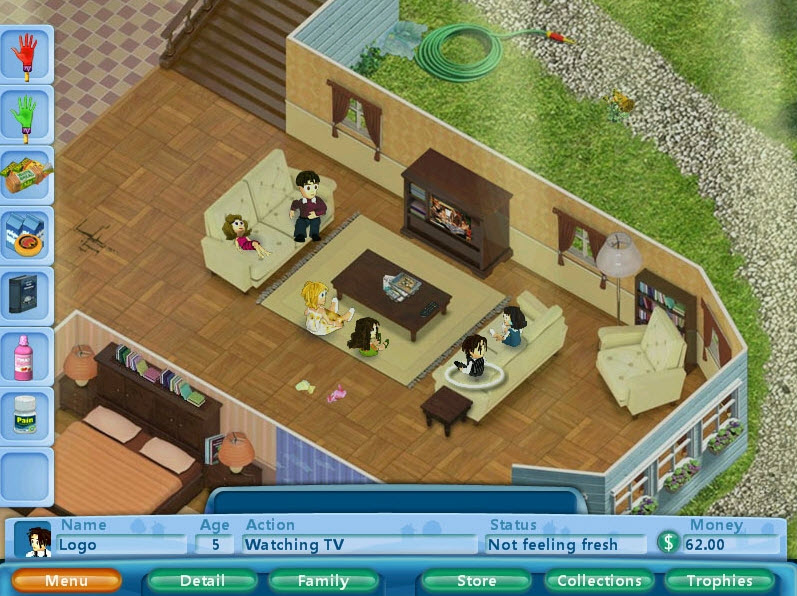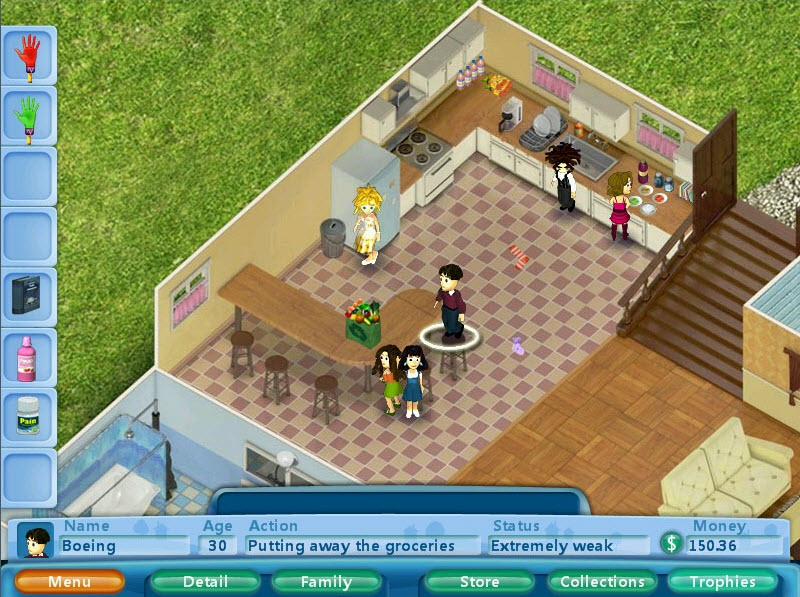 Last Day of Work is launching a new casual web game dubbed Virtual Families today. It’s a family simulation game that hopes to carve out a market in the shadow of the giant Electronic Arts franchise, The Sims, which has sold more than 100 million copies and which launches its third version in June.
Last Day of Work is launching a new casual web game dubbed Virtual Families today. It’s a family simulation game that hopes to carve out a market in the shadow of the giant Electronic Arts franchise, The Sims, which has sold more than 100 million copies and which launches its third version in June.
Arthur Humphrey, co-founder and lead designer of Last Day of Work, says he isn’t intimidated by the comparison because Virtual Families also incorporates elements of Nintendo’s Animal Crossing cutesy simulations.
Humphrey also sees Virtual Families as fixing some of the flaws of The Sims, which is a complicated game and appeals to people who want to sink a lot of time into an experience. By contrast, Virtual Families is a casual game, more akin to a Tamagotchi virtual pet. You help your families live their virtual lives, get them through the day’s chores or assist them with huge life decisions, always paying attention to a budget.
We had early look at Virtual Families in February before it launched publicly.
“My wife Carla wanted to like The Sims,” Humphrey said. “But it’s not for casual players because of the 3-D camera controls.”
 With The Sims, you can create your own character in a very detailed fashion. With Virtual Families, you get to choose from a bunch of random characters who have already been designed for you. Customization, while users like it, adds a lot of complexity and programming work, Humphrey said.
With The Sims, you can create your own character in a very detailed fashion. With Virtual Families, you get to choose from a bunch of random characters who have already been designed for you. Customization, while users like it, adds a lot of complexity and programming work, Humphrey said.
You plop the character into a home and then watch it function autonomously. You help it do things by picking it up and placing it on top of items. If you place it on top of trash, it starts cleaning the house. You can micro-manage the character and watch how its various meters, such as happiness level, progress. Or you can just make big decisions, like whether to get married, and watch them unfold.
The game play is more casual, meaning you can play the game in short bursts when you have free time. And the target audience is younger, including “tweens” or those in between being kids and teens.
As in The Sims, the characters will plead with you if they really want something. You can praise behavior that you like with a “praising glove” and discourage bad behavior with a “scolding glove.” If you praise a character for working, it might become a workaholic. You can shop for food and get items the family likes.
Your family is always active and aging, whether you are logged in or not. If you don’t log in for a while, they will starve and die. The virtual people live accelerated lives. They grow up and age in the course of a week. The characters die, but their offspring replace them and inherit the house and belongings. You can collect a lot of objects in the game, including a bunch that are hidden around the home.
 Events can drive little family crises. If one member gets sick, you have to take care of that person, or the illness can spread to the rest of the family. You can sign the family member up for a dating service and accept or reject dates. But if you reject too many, you run the risk of becoming a loner.
Events can drive little family crises. If one member gets sick, you have to take care of that person, or the illness can spread to the rest of the family. You can sign the family member up for a dating service and accept or reject dates. But if you reject too many, you run the risk of becoming a loner.
It’s amazing that all of this complexity comes from such a small team. San Francisco-based Last Day of Work started as a husband and wife duo, Arthur and Carla Humphrey, (pictured right) in 2004. Their first title was built on a $5,000 budget. Now it’s added 10 contractors who are distributed across the country. The company never had to raise outside capital and is profitable.
Its first games were published by BigFish Games and now it publishes its titles itself across a number of sites. It has 20 versions of its games, such as Fish Tycoon and Plant Tycoon, with a huge reach across the PC, Mac and mobile platforms. Through distribution partner Wild Tangent, the games come pre-installed on Dell and Hewlett-Packard consume PCs.
In 2007, the company came up with the hit title Virtual Villagers, where you could build an entire village from one person to 80 people. Then in 2008, it launched Virtual Villagers 3. That game serves as the engine, or base platform, for Virtual Families.
Virtual Families runs on the traditional downloadable game model, dubbed “try before you buy.” You can play the game for an hour, and, after that, you have to pay $20 for the entire game. An iPhone version will debut in May.
Other casual games are embracing the free-to-play model, where you play a game for free and spend money on virtual goods in the game. But Humphrey said he believes the try-before-you-buy model still works fine. At some point, particularly with future versions coming up, Last Day of Work will look closely at the virtual goods model.
VentureBeat's mission is to be a digital town square for technical decision-makers to gain knowledge about transformative enterprise technology and transact. Learn More
